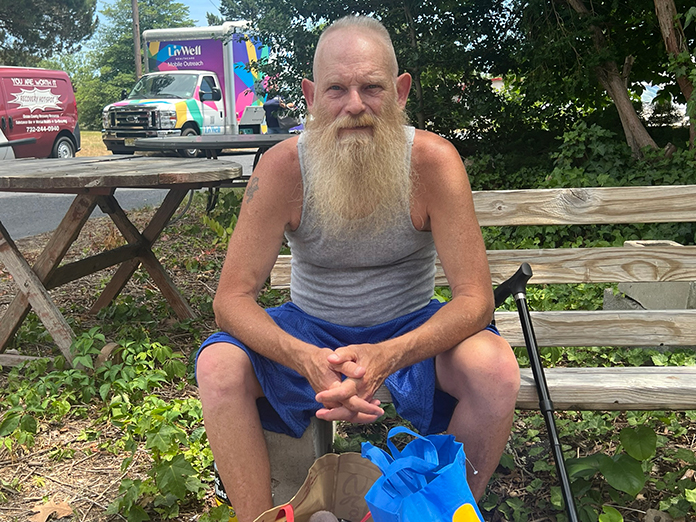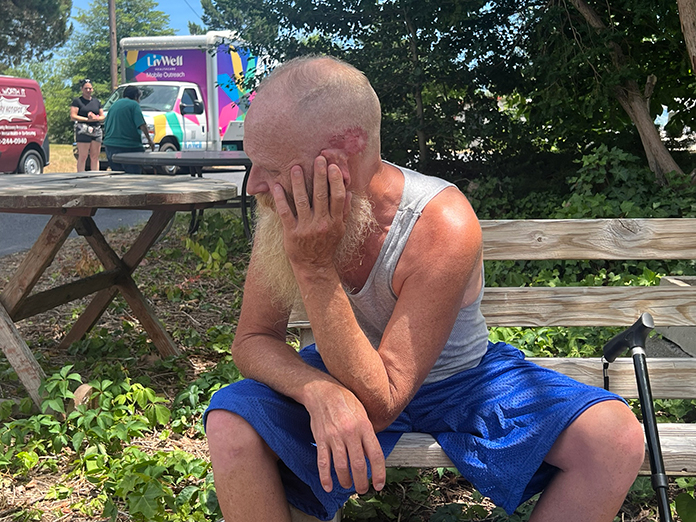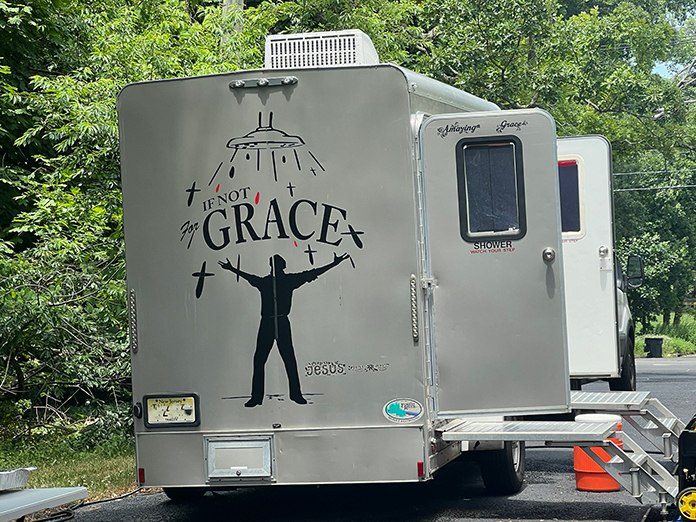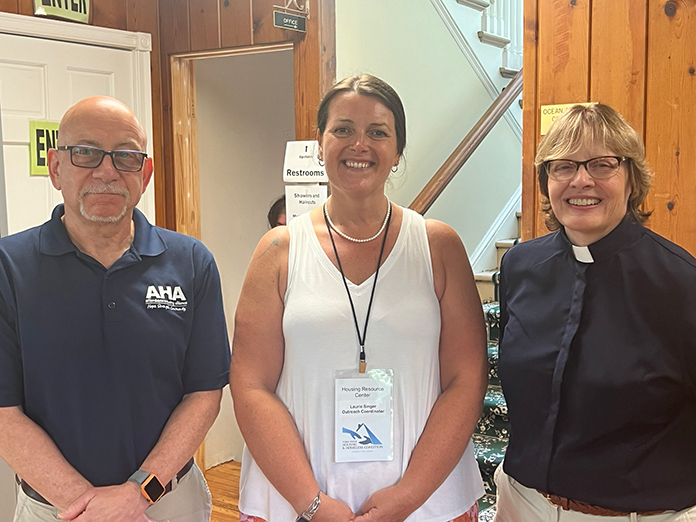
TOMS RIVER – As Ocean County sweltered in a heat wave, the plight of the county’s homeless population remains a “hot” topic of concern. While many residents seek relief in air-conditioned homes, others struggle to find shelter from the brutal sun.
The Toms River Housing and Homeless Coalition, a collaborative group of faith-based leaders, non-profits, and government agencies, is at the forefront of addressing the crisis. Formed four years ago, the Coalition aims to provide comprehensive support to those in need.
Mental illness, substance abuse, and criminal records are common barriers to fulfilling housing needs. The Coalition’s system includes follow-ups to ensure ongoing support for those they help.
The range of participating organizations is extensive and diverse, from hotel stays, food pantries, mental health providers, and rehousing assistance. The list of groups offering services is not dependent on those who have a formal connection to Ocean County Social Services.
The Coalition runs the Ocean County Housing Resource Center located at Ocean Christian Community, 405 Washington Street in Toms River. The resource center’s location is easily accessible from the downtown area.

“Everybody who thinks of the homeless has a mental picture in their head,” said Reverend Susan Jones, President of the Coalition and pastor of Holy Cross Lutheran Church. “The reality is that homelessness is a symptom of something else.”
“It’s the underlying issue that creates homelessness that’s the problem,” Jones continued. “There are a lot of different things that create the situation, and it’s determining the causes that helps us know how to direct people to the right solution.”
Ocean County homelessness advocates often point to the county’s lack of an emergency shelter to combat the local crisis. However, shelters are considered somewhat of a Band-Aid solution. Ocean County also faces a shortage of affordable housing, a crucial step for those seeking long-term stability.
Those eligible for supportive housing often find themselves on waiting lists for years – as there are no places to accommodate them.
One of the Coalition’s partners is the Affordable Housing Alliance (AHA), which offers various services. Jerry Zucker, AHA’s Program Manager for Homeless Services, highlighted the organization’s role in facilitating rapid rehousing and rental assistance.
“We handle anyone identified as homeless in Ocean County,” Zucker said “Our coordinated entry process ensures they receive the necessary referrals and support. They work through the continuum of care to find what other services they may need.”
Zucker said that the non-profit’s rapid rehousing program has been fairly successful and has helped a number of people break through barriers. When asked, Zucker said AHA has been able to rehome five families over the last several months who lived in tents set up by Destiny’s Bridge under the leadership of Minister Steve Brigham.
“The rehousing program in particular helps people who don’t otherwise have a support system such as family,” Zucker added.
Agency Days: One-Stop Shop for Support and More
The Coalition’s logo tagline is “Compassion, Hope, Progress,” is embodied by Laurie Singer, the group’s Outreach Coordinator.
“I am not the hands-on guy,” said Jones. “That’s why we have Laurie here.” Before joining the Coalition, Singer was a professional massage therapist whose career was impacted by COVID-19. Her welcoming and comforting demeanor has since become instrumental in putting everyone at ease and fostering collaboration within the group.
At a recent Agency Day at the Resource Center, numerous agencies coordinated efforts to provide a seamless experience for people experiencing homelessness. For some individuals, it was as simple as picking up their mail as the Coalition provided them with an address. Others likely enjoyed grabbing a hot dog from the sizzling grill outside.
The event included mobile showers provided by “If Not for Grace Mobile Showers,” a ministry from Egg Harbor City, and haircuts from “Helping Assist with Melis.”

Susan and Terry Luma, the founders of the mobile shower ministry, have been offering this service statewide to provide dignity and cleanliness to people experiencing homelessness. They hook up to an outside spigot to enable private shower rooms installed in trailers.
“I work with the mobile shower group as well, “Melissa Verge-Loutas of “Helping Assist with Melis” said. “They have their own licensing we work together as a group. My crew are all licensed hairdressers and offer haircuts. We also give out clothes and blessing bags.”
Verge-Loutas said she recognized addiction as leading to homelessness for a great many people. She was never addicted, but it still hit home for her. Verge-Loutas introduced Daniel Torella as someone shadowing her and involved in peer recovery.
Torella, who was homeless for five years, is now a certified peer recovery specialist. He recently created Sober Seeds to help others who are homeless related to addiction.
“I was addicted to anything that made me feel good,” said Torella, who’s been sober for two years. “I was a district manager for Dunkin Donuts in sobriety. I ran eight stores, and I often quit my job to work in this field because I knew that I could make a difference.”
One Man’s Story
The scorching sun found Ken Krog, 59, sitting under a tree for some shade. He’d just had a shower and was happy it was a cool one. While his beard was long and largely untamed, he sported a new haircut. The trim also made it easy to see some angry redness on the side of his head.
A dermatologist diagnosed the red lesions as basal cell carcinoma and advised Krog that he needed a plastic surgeon for removal. Still, he has yet to find a doctor willing to perform the procedure for free.
It was the first time Krog visited the offices at the resource center, and he was glad he did. He previously worked in construction and drove a truck and now gets around with a cane. His income is limited to $185 monthly in general assistance and food stamps. He’s been fighting for social security disability for the last three years to no avail.
“I had an accident in May of 2021 that destroyed my hip and my pelvis, and it’s been a slow recovery,” said Krog. “Since right after that, the guy I was renting a room from told me to leave since I had no money coming in.”

Krog said he lived in a motel in another county arranged by social services for a short time. After killing 28 mice in eight hours, Krog decided he was much better off finding an alternative.
Since then, Krog’s been living in a tent behind the ShopRite in Brick Township. He is mostly alone, although another man lives in a separate tent a few hundred yards away.
One of Krog’s regular meals is Ramen noodles, which he cooks using a small alcohol burner stove surrounded by stones to contain any spills. Krog has stayed in the same location since leaving the motel, assuring his neighbors in nearby houses that he wouldn’t light any campfires.
“I’ve got a really good network of people. Somebody just came by like two weeks ago brought me a tote full of shorts and T shirts. I got another buddy who comes and picks up my laundry, takes it to his house, and does it for me,” Krog said.
Police and others have urged Krog to seek shelter from the cold during the winter months. However, he has declined their offers, preferring to maintain his independence rather than being locked up in one of the Code Blue facilities.
“I actually like where I’m living,” he said. “It’s quite liberating.”






